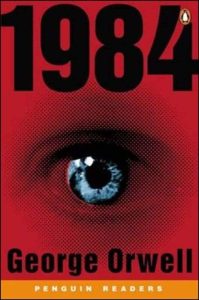
In celebration of Science-Fiction Day, this year we are taking a look at George Orwell's masterpiece, 1984.
George Orwell was born as Eric Arthur Blair, and raised in England. In the 1930s, a disillusioned Orwell travelled to Spain, where he volunteered service in the Republican forces during the Spanish Civil War. As the tide turned and the Nationalist faction of Franco took over, Blair disparaged over infighting of the Republicans and their allies, particularly the POUM, the group he briefly joined. By war's end, Blair tired of all such communists, broadly speaking, and fled the country for his own safety.
In the intervening years, Blair assumed his new pen name, George Orwell, named after the Orwell river in England. He also published Animal Farm, his first great critique at communism and the corruption of power.
After the end of World War II and the political upheaval it brought, Orwell foresaw potential crises with the USSR and Communist China. Orwell penned his next work in the years following, and finally published his next work in 1954, thirty years prior to the titular date.
1984 follows the life of Winston Smith, a single and middle-aged man working for the Department of Truth, the propaganda wing for the tyrannical government of Oceania. His job is to rewrite books and newspapers, editing dates and facts to support whatever stance the powers-that-be demand. Secretly hating his life and the oppressive socialist government he works for, Winston begins a secret love affair with a coworker and the two join a rebel movement hoping to bring down the regime. Winston unfortunately learns that it was all a ruse, as he is betrayed to the government, tortured, and brainwashed until he happily accepts the way things are.
This bleak story painted a grim picture of what might become of Orwell's native England, if it fell under an oppression similar to that of the USSR.
In years since, 1984 has been both embraced and vilified, held up as a scary postulation against the sinister enemies of whatever country you happen to live in, or a subversive fairy tale that undermines otherwise hardworking citizens. Over the years, both novels by Orwell have been challenged by concerned parents and institutions, for varying reasons, but both novels have endured as modern classics, and frequent reads in high school English.
And yet, for all of the hype of 1984 being a seminal work of science fiction, it is ironic and even humorous that one of the Big Threes of Science Fiction, Isaac Asimov, detested the book and took offense over comparisons to other science fiction work. Suffice it to say he was not a fan. His argument: simply taking place later in the future was not enough to warrant being science-fiction.
"In short, if 1984 must be considered science-fiction, then it is very bad science fiction."
-Asimov, Asimov on Science
So feel free to add 1984 to your reading list and see for yourself what Mr. Orwell has to say about power being a means unto itself.
Happy reading.


Add a comment to: Science-Fiction Day: 1984 by George Orwell